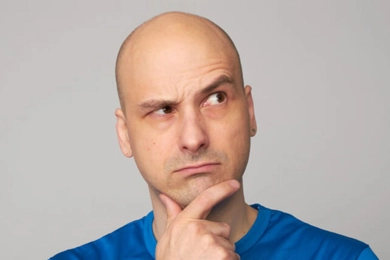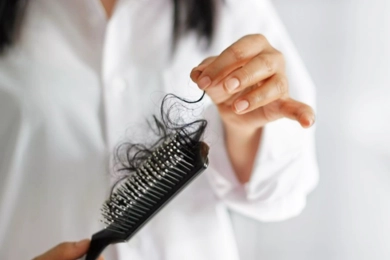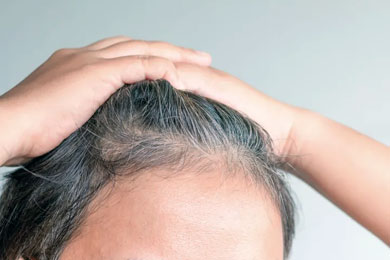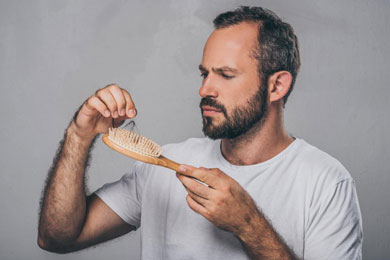
A sizable percentage of males suffer from hair loss, a normal yet frequently upsetting condition. This thorough book explores the many factors that contribute to male hair loss, providing information and understanding that is essential for comprehending this difficult condition. By delving into the fundamental causes, we hope to provide insightful knowledge that connects with our audience and highlights the complex nature of male pattern baldness.
Alopecia Androgenetica: The most prevalent cause of hair loss in men is androgenetic alopecia, also referred to as male pattern baldness.
Genetic Predisposition: A combination of genes acquired from both parents contributes to the majority of the hereditary component of this illness, which affects about 50% of males by the age of 50.
DHT Influence: Dihydrotestosterone (DHT),a testosterone derivative, plays a critical part in this process. DHT causes hair follicles to shrink, which shortens the lifecycle of hair and causes thinning and eventually hair loss.
Hormonal Imbalances: In addition to DHT, thyroid hormone abnormalities in particular can cause hair loss.
Medical Conditions: Hair loss is a documented secondary sign of several medical conditions, including lupus, diabetes, and iron deficiency anemia.
Nutritional Deficiencies: Weakened hair growth can result from a diet deficient in essential elements such as minerals, vitamins (particularly biotin),and proteins.
Stress and Mental Health: Telogen effluvium, a kind of hair loss in which hair prematurely enters the resting phase, can be brought on by high amounts of stress and specific mental health issues.
Environmental Aggressors: Pollution, UV rays, and harsh chemicals are among factors that can cause hair loss and weakening.
Side Effects of Medication: Hair loss is a side effect of several medications, such as beta-blockers, blood thinners, and chemotherapy therapies.
Anabolic Steroids: In males who are prone to male pattern baldness, the use of anabolic steroids for bodybuilding might hasten hair loss.
Natural Aging Process: Men's hair naturally thins and recedes with age. This process usually manifests itself more prominently in men who are prone to hair loss.
Autoimmune Disorders: Patchy hair loss is a symptom of the autoimmune disorder alopecia areata.
Infections and Scalp Conditions: Fungal diseases such as ringworm and scalp illnesses like seborrheic dermatitis can cause hair loss, either permanent or transient.
In summary
Comprehending the underlying reasons behind male pattern baldness is essential to effectively managing this issue. Although hereditary elements are important, it's important to recognize the influence of environmental circumstances, lifestyle choices, and medical issues. The management and potential reversal of hair loss can be greatly aided by early intervention and a comprehensive approach.
The most typical cause is male pattern baldness, or androgenetic alopecia. Dihydrotestosterone (DHT),a testosterone derivative, causes hair follicles to atrophy in a genetic disease.
Male pattern baldness is largely influenced by genetics. Males who have a family history of baldness are more susceptible to it. The vulnerability to hair loss and its pattern are influenced by certain genes that are inherited from both parents.
Yes, telogen effluvium, a kind of hair loss, can be brought on by excessive amounts of stress. It causes temporary hair thinning and increased shedding by forcing hair follicles into a resting phase.
Hair loss is not exclusively tied to aging, while it can be a normal aspect of aging. Important roles are also played by variables such hormone fluctuations, heredity, and medical problems.
Hair loss is greatly impacted by hormonal abnormalities, particularly those involving testosterone and DHT levels. DHT causes hair follicles to shrink, which eventually results in hair thinning and loss.
Insufficient intake of certain nutrients, particularly those high in iron, zinc, proteins, and vitamins, might inhibit hair growth and exacerbate hair loss.
The susceptibility to develop male pattern baldness is inherited from one's family, and the condition is mostly hereditary.
The answer is that DHT attaches itself to receptors in hair follicles, causing them to weaken, shrink, and eventually cease generating hair.
Hair loss is not brought on by donning a hat or a helmet. Nonetheless, wearing extremely tight headgear may exacerbate traction alopecia.
Diseases like hyperthyroidism and hypothyroidism can cause hair loss and thinning.
Hair loss can occasionally result from taking drugs for high blood pressure, depression, arthritis, cancer, and heart issues.
Smoking has been shown to hasten hair loss, damage hair follicles, and reduce blood supply to the scalp.
The overuse of some hair products, such as those containing harsh chemicals, can weaken hair and may even cause hair loss.
Indeed, because fungal infections harm hair follicles, they can result in either temporary or permanent hair loss.
Toxins and pollutants have the ability to harm hair follicles and throw off hormonal balances, which can result in hair loss.
Tight hairstyles like cornrows or ponytails can result in traction alopecia, which is the loss of hair.
Weakened hair growth and greater shedding can result from deficiencies in essential nutrients such as iron, protein, and vitamins.
Man's hair loss is not directly impacted by menopause in partners. Hormonal fluctuations and genetics are the main individual variables contributing to hair loss in males.
Absolutely, a condition known as scarring alopecia can result in permanent hair loss in the affected area of the scalp from physical trauma or injury.
While exposure to direct sunlight can damage hair shafts and make hair brittle and more prone to breaking, it doesn't usually cause hair loss.
Are autoimmune diseases a cause of hair loss in men?
Autoimmune disorders that target hair follicles, such as alopecia areata, can result in abrupt hair loss in patches.
Can anabolic steroids lead to hair loss in men?
In particular, males who are prone to male pattern baldness, the use of anabolic steroids can hasten hair loss.
Is hair loss in men linked to prostate health?
Due to comparable hormonal effects, there is some indication that disorders affecting the prostate that are influenced by DHT may be somewhat related to hair loss.
How does alcohol consumption affect hair loss in men?
Drinking too much alcohol can cause hormonal imbalances and nutritional deficits, which may exacerbate hair loss.
Can dehydration contribute to hair loss in men?
Although dehydration doesn't directly cause hair loss, it can have an adverse effect on the general health of hair.
Does frequent shampooing cause hair loss in men?
Regular shampooing doesn't cause hair loss, although regular use of strong shampoos can make hair weaker.
Can psychological conditions like depression cause hair loss in men?
Hair loss is not a cause of depression per se; but, hair loss is a side effect of some drugs used to treat depression.
Is dandruff linked to hair loss in men?
While dandruff itself does not cause hair loss, the itching and scratching that is linked to it can cause temporary hair loss.
Can heavy metal exposure lead to hair loss in men?
Exposure to heavy metals such as lead, mercury, and arsenic can cause hair loss by interfering with the cycles of hair growth.
Is there a link between cardiovascular health and hair loss in men?
According to studies, there may be a connection between male pattern baldness and cardiovascular health problems, perhaps as a result of common risk factors including age and hormone fluctuations.
 Unveiling the Mystery: Understanding Hair Loss in Women
Unveiling the Mystery: Understanding Hair Loss in WomenOur comprehensive examination of hair loss is a subject that affects a great number of women worldwide. We will examine the various complex causes of hair loss in women in this blog post, including lifestyle ...
 Stress, Anxiety And Hair Loss: Are They Related?
Stress, Anxiety And Hair Loss: Are They Related?Millions of people around the world struggle with the common problem of hair loss. Many people wonder if anxiety and psychological stress can also cause hair loss, which can be brought on by numerous factors ...
 Causes, Remedies, and Prevention of Hair Loss
Causes, Remedies, and Prevention of Hair LossFor both men and women, experiencing hair loss can be upsetting. Numerous factors, such as genetics, hormonal changes, medication, illness, and inadequate nutrition, can cause it. ...